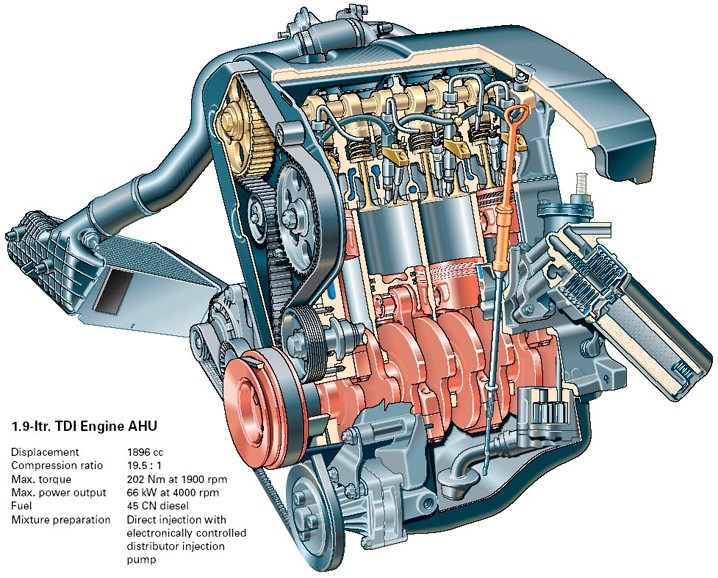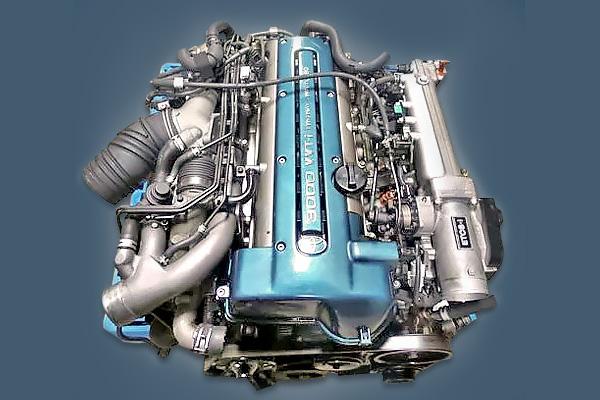
1.9 TDI engine - what is worth knowing about this unit in VW models?
Content
- 1.9 TDI engine - in which models was the unit installed?
- Features of the unit from the Volkswagen Group
- Solutions implemented in first generation engines
- 1.9 TDI PD engine with injection pump
- Were there any drawbacks to the 1.9 TDI engines?
- Important points in the context of operation - replacing the timing belt and oil
- Selected VW models - how do they differ?
- Is the 1.9 TDI engine good? Summary
It is worth knowing what the abbreviation TDI itself means in development - Turbocharged Direct Injection. This is a marketing term used by the Volkswagen Group. It defines turbocharged diesel engines equipped with not only a turbocharger but also an intercooler. What is worth knowing about the 1.9 TDI engine? Look at yourself!
1.9 TDI engine - in which models was the unit installed?
The 1.9 TDI engine was installed by Volkswagen in various car models produced in the 90s and 2000s. Among them we can mention such cars as VW Golf or Jetta. The plant was upgraded in 2003. An additional element was a pump-type fuel injection system. The 1.9 TDI engine was discontinued in 2007. However, the name TDI was used even later, in 2009, for the Jetta model. The block was mounted in cars:
- Audi: 80, A4 B5 B6 B7, A6 C4 C5, A3 8L, A3 8P;
- Location: Alhambra, Toledo I, II and III, Ibiza II, III and IV, Cordoba I and II, Leon I and II, Altea;
- Skoda: Octavia I and II, Fabia I and II, Superb I and II, Roomster;
- Volkswagen: Golf III, IV and V, VW Passat B4 and B5, Sharan I, Polo III and IV, Touran I.
Features of the unit from the Volkswagen Group
The 1.9 TDI engine from Volkswagen produced 90 hp. at 3750 rpm. This affected engines manufactured between 1996 and 2003. In 2004, the fuel injection system was changed. As a result of the changes, the unit was able to develop a power of 100 hp. at 4000 rpm.
1.9 TDI engine specifications
Its exact volume is 1896 cm³. To this is added a cylinder with a diameter of 79,5 mm, as well as 4 cylinders and 8 valves. Stroke 95,5 mm, compression ratio 19,5. The TDI engine was also equipped with a Bosch VP37 directional pump injection system. This solution was used until 2004. On the other hand, unit injectors used for hydraulic fuel injection in a diesel engine were used until 2011.
Solutions implemented in first generation engines
Thanks to the use of a two-stage injector, the unit made less noise during operation. It consisted of the first minor injection preparing the cylinder for the main cylinder fuel injection. At the same time, combustion improved, which in turn resulted in reduced engine noise. The 1.9 TDI-VP also has a turbocharger, intercooler and EGR valve, as well as heaters in the cooling system. This made it easier to start the car at low temperatures.
1.9 TDI PD engine with injection pump
With the advent of 1998, the German concern introduced a refreshed 1.9 TDI unit with a new injection pump with a nozzle that replaced the traditional nozzles and pump. This resulted in higher injection pressure and reduced fuel consumption, as well as improved unit performance. However, the result was higher maintenance costs due to the installed floating flywheel and variable geometry turbine.
Were there any drawbacks to the 1.9 TDI engines?
Poor work culture is listed as the division's biggest weakness. The engine created a lot of noise and vibration during operation, which could be especially annoying when using lower class cars. It happened at low speeds. At a speed of about 100 km / h, the problem disappeared.
Important points in the context of operation - replacing the timing belt and oil
When using a 1.9 TDI engine, it is very important to follow the replacement of the timing belt. This is due to its additional load. The camshaft moves the injector pistons, which create high pressure, and a very large mechanical force is required to move the piston itself. The part is to be replaced when the mileage increases from 60000 km to 120000 km. If you buy a car in the secondary market, it is worth replacing this engine part immediately after purchase.
Remember to change your oil regularly
Like many types of turbo engines, this engine "loves oil" and therefore the oil level should be checked regularly, especially after a long trip when the 1.9 TDI diesel has been under heavy load.
Selected VW models - how do they differ?
1.9 TDI engines with a rotary pump with power from 75 to 110 hp are considered reliable. In turn, the most popular version is a 90 hp diesel unit. Most often it was an engine with fixed geometry turbines, and in some variants there was also no floating flywheel, which led to lower operating costs. It has been calculated that the 1.9 TDI engine can run smoothly, with regular maintenance, even over 500 km with a dynamic driving style.
Volkswagen Group carefully guarded its technology
He did not share the engine with other corporations. The only exception was the Ford Galaxy, which was the Sharan's twin, or the Seat Alhambra, also owned by the German manufacturer. In the case of the Galaxy, drivers could use 90, 110, 115, 130 and 150 hp TDI engines.
Is the 1.9 TDI engine good? Summary
Is this unit worth considering? The advantages of this motor include low maintenance costs and reliability. Higher costs can lead not only to floating flywheel versions, but also to diesel particulate filter versions. However, regular maintenance and servicing by a professional mechanic can help avoid costly problems with your diesel particulate filter or other engine parts. Such a well-maintained 1.9 TDI engine is certainly able to return the favor with smooth operation and good performance.
